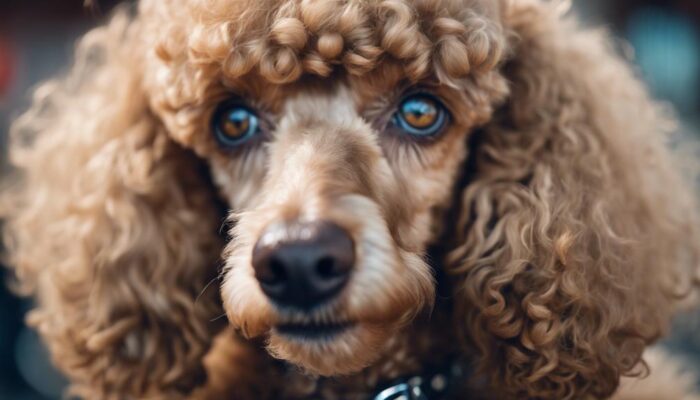Poodles are intelligent, energetic dogs that make wonderful companions. However, like all breeds, poodles are prone to certain health issues, including some eye problems. As a poodle owner, it’s important to understand the most common poodle eye diseases so you can watch for symptoms and get veterinary care when needed. With proper prevention and treatment, you can help protect your poodle’s vision and quality of life. In this article we talk about Poodle Eye Problems.
Common Poodle Eye Diseases
Poodles are predisposed to several inherited eye conditions including progressive retinal atrophy, cataracts and glaucoma. These diseases can lead to vision loss and blindness if left untreated. Being aware of the signs of eye disease allows early veterinary intervention which gives the best chance of preserving vision or slowing disease progression.
Progressive Retinal Atrophy
Progressive retinal atrophy (PRA) is an inherited, degenerative disease of the retina causing progressive vision loss leading to blindness. There are several forms of PRA that affect poodles. The most common form shows initial symptoms around 3-5 years old. Affected dogs lose sight in dim light and darkness first before eventually progressing to total blindness.
Signs of PRA include
- Reluctance to go out at night
- Difficulty navigating in dim light
- Dilated pupils
- Bumping into objects/walls
There is no treatment for PRA but animal health studies are working on gene therapy research to potentially restore partial vision loss from this disease in the future.
Cataracts
A cataract is an opacity in the lens of the eye that can cause blurry vision and eventual blindness if untreated. Cataracts are common in senior poodles over 6 years old but can develop at any age from inherited genetic conditions, diabetes, eye injury, or inflammation. Signs of cataracts include cloudy pupil color, clumsiness in dim light, excessive blinking or eye squinting and reluctance to go out at night.
Cataract surgery to remove the lens is an option to restore vision loss. After surgery, dogs require prescription eye drops multiple times per day for the rest of their lives. Recent advances in cataract surgery for dogs including phacoemulsification and artificial lens implantation are providing improved surgical outcomes.
Glaucoma
Glaucoma refers to increased pressure within the eye caused by inadequate drainage of intraocular fluid. Pressure on the retina and optic nerve eventually leads to blindness. Glaucoma is a painful condition and the eye often appears red due to inflammation and additional blood vessels on the white of the eye. Breeds with shallow eye sockets like poodles have an increased risk.
Middle to older aged dogs are most commonly diagnosed though it can occur at any age. Signs include:
- Squinting
- Redness
- Cloudy eye
- Enlarged eye
- Reluctance to go out at night
- Pawing at the eyes
Glaucoma requires immediate veterinary treatment to decrease pressure and save vision. This may include eye medications like beta blockers as well as surgery when needed. Even with aggressive treatment, damage cannot be reversed once nerve cells in the retina die from high pressure. Lifelong monitoring and medication are necessary once a dog develops glaucoma.
Other Poodle Eye Problems
In addition to major diseases, poodles can be affected by numerous other eye conditions including:
- Eyelid abnormalities – abnormal growth of eyelashes causing eye irritation. Often requires corrective surgery.
- Dry eye – insufficient tear production leading to eye redness and discomfort
- Eye infections – bacteria, viruses and fungi can cause conjunctivitis (pink eye)
- Eye injuries – foreign objects, scratches, blunt trauma. Can lead to infection, inflammation and vision loss. Requires rapid veterinary care.
- Allergies – environmental allergies to pollen or chemicals irritate the eyes
Protecting Your Poodle’s Eyes
While poodles are prone to inherited eye diseases later in life, there are several things you can do to keep their eyes healthy:
Get thorough ophthalmic exams
Starting as a puppy, regular eye exams by your veterinarian are important to evaluate for early signs of inherited diseases. Based on exam findings, genetic testing may be recommended for conditions like PRA. Annual exams after age 5 are especially crucial to identify age-related eye diseases early.
Feed a healthy diet
High quality dog foods support eye health. In particular, foods rich in omega-3 fatty acids from fish oil, vitamins E and C, zinc, beta carotene and lutein provide antioxidants to reduce cell damage in eye tissues. Avoid obesity which increases risk of diabetes and subsequent cataracts.
Control environment
Use harnesses instead of collars, keep floors free of clutter, supervise play with other pets and avoid activities where foreign material could enter eyes. These steps reduce injury risk. Also avoid exposing your poodle to secondhand cigarette smoke which contributes to eye disease.
Monitor for symptoms
Check your poodle’s eyes daily for redness, swelling, discharge or other abnormalities and see your vet promptly if you observe signs of eye discomfort or vision issues. Catching problems early is key to effective treatment.
Consider preventatives
Discuss using anti-inflammatory eye drops or glaucoma medications with your vet for at-risk dogs. Though eye diseases cannot always be prevented, these drugs may delay onset or slow progression in some cases.
In addition to watching for eye disease, good general health supports ocular wellness too. Grooming face and head hair regularly prevents hairs around the eyes that could scratch the cornea. Keeping ears clean reduces spread of bacteria and yeast that could travel to the eyes. And maintaining parasite prevention prevents organisms that can migrate into tissues surrounding the eyes.
Though poodles are prone to serious eye diseases, many dogs retain excellent vision well into their senior years. Close monitoring paired with prompt veterinary care when eye abnormalities appear gives your poodle the best chance of healthy eyes and clear sight throughout life. Committing to regular eye health evaluations and strict follow up when problems are found makes preserving vision possible. With extra attention to eye care, your poodle can continue enjoying everything the world has to see even as they grow older. I sincerely hope you find this “Poodle Eye Problems-Protecting Your Poodle’s Vision” article helpful.

Dr. Ananya Singh, the expert behind ThePetster.com, is a dedicated veterinarian with over 9 years of experience in animal health and welfare. She holds a Doctor of Veterinary Medicine (DVM) degree. Dr. Singh specializes in comprehensive pet care, preventative health, and holistic wellness. Follow her on Instagram for expert advice and updates.
